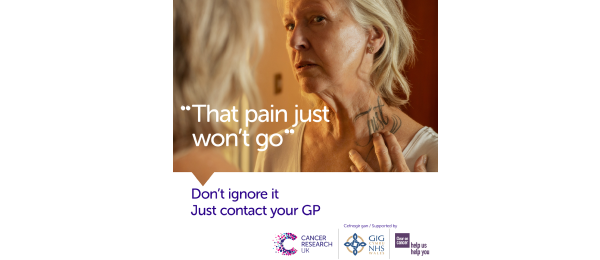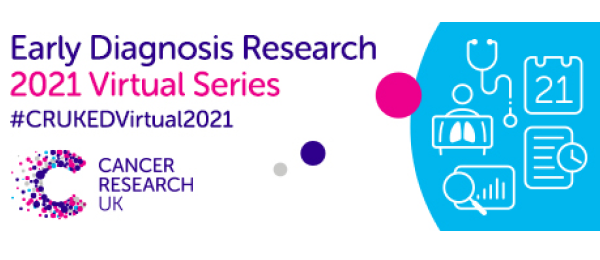| Dear Supporter, Welcome to the July 2021, Early Diagnosis newsletter. We’re over halfway through what continues to be a very strange year. With the ongoing effects of the pandemic and concerns about rising cases and implications for health and cancer services, we continue to do all we can to monitor, mitigate, and learn from the impacts on cancer diagnosis, at the same time as keeping a very firm eye on the wider research and transformation agenda, that will enable a system that can deliver world class cancer outcomes for people affected by cancer. As is usual, this newsletter features news and updates about our work, as well as what we hope are useful signposts to some of the other things happening within the early diagnosis community.
Stay safe and thank you for reading.
Best wishes, Dr Jodie Moffat and the Strategic Evidence team (formerly Early Diagnosis)
Cancer Research UK |
|
|---|
|
|---|
|
|
 |
CRUK Wales Campaign: Encouraging the public to present to their GP COVID-19 has had a wide-reaching impact, which includes on how people respond to changes in their health. Barriers to help-seeking that existed prior to the pandemic continue and have been added to or exacerbated by the pandemic. Consultations for symptoms that could be cancer have fallen with a concern that people, including older people in particular, have been slower to come forward. This shift in public behaviour is likely contributing to the reductions that were seen in urgent suspected cancer referrals over the pandemic. While monthly referrals for some urgent routes have returned to pre-COVID levels, this is not the case across the board and has not been enough to make up for the reductions in previous months. Thousands fewer patients started treatment for cancer over the first year of the pandemic than would have been expected. This element of Covid impact has highlighted just how central timely action by the public is. Initiatives such as Help Us Help You in England and public facing campaigns in Scotland have been developed to encourage the public to come forward with symptoms. Recently Cancer Research UK secured external grant funding to run a multi-channel campaign in Wales until the 18th July. It aims to positively influence the public’s attitudes to help seeking, shift barriers and ultimately encourage timely presentation to the GP with potential signs and symptoms of cancer. The campaign, which is supported by NHS Wales, is targeted at all adults aged 50+ within lower socioeconomic groups, based on insight and intel on those in greatest need, we’ll be evaluating the campaign and are keen to see what we can learn. Already the campaign has brought to the fore some of the challenges that exist around accessing GPs and primary care staff, given everything that is going on. This continues to be something we raise with policy makers. A second phase of the activity will also run in Wales from the 16th August to the 26th September. Find out more about the CRUK Public Wales campaign here
For Health Professionals, download the campaign briefing document below. |
|
|---|
|
|---|
|
|
Public Health England Blog on Informed Choice Cancer Research UK is committed to promoting informed choice in cancer screening participation. We believe the current national NHS cancer screening programmes are important, but we also believe taking part in screening is an individuals’ choice. We outline in the latest PHE Screening blog how health professionals have an important role to play in supporting people to make an informed choice to access cancer screening. |
|
|---|
|
|---|
|
|
 |
CRUK Early Diagnosis Research - Virtual Series 2021 New dates confirmed for 18th & 24th November More information to follow in the next ED Newsletter in September. In February and March 2021, we hosted our first CRUK Early Diagnosis Research Virtual Series. The move to a series of virtual events was a new concept for Cancer Research UK’s Strategic Evidence Team (formerly Early Diagnosis) who were more used to delivering the face to face CRUK Early Diagnosis Research Conference every two years. A significant silver lining of this shift in approach was that we were able to welcome more people to join us and engage with our wider Early Diagnosis community across the world. Due to the success of the sessions we are in the midst of planning another two sessions this autumn. All of those who registered for any of the previous sessions will automatically receive confirmation of the dates and registration details soon. If you didn’t register for any of the sessions and you want to hear more about the forthcoming sessions in the virtual series please contact us via the button below. |
|
|---|
|
|---|
|
|
Primary Care Research: Diagnostic Tests The Covid-19 pandemic has had significant impact on the lung cancer pathway and urgent referrals for suspected lung cancer have been particularly slow to recover. Lung cancer presents significant diagnostic challenge in primary care given signs and symptoms are often non-specific and common to many benign conditions including COVID-19. Chest x-ray remains the first line test for the investigation of symptomatic patients but research in recent years has sparked debate around the role of this test given its relatively high false negative rate. More recently, some exciting research led by Dr Stephen Bradley, University of Leeds, provides more clarity to the role of chest x-ray, supporting its utility in a low prevalence setting. We were pleased to have Dr Stephen Bradley join as a guest speaker on NB Medical’s webinar ‘Lung Cancer Diagnosis in 2021’ in conjunction with CRUK, where he discussed this research and tackled the ‘false negative dilemma’. A fantastic editorial in BJGP continues this debate and provides important advice for GPs around interpreting negative test results across the lung, colorectal and ovarian cancer pathways. |
|
|---|
|
|---|
|
|
Early Diagnosis Data Hub Our new early diagnosis dashboard, developed by colleagues in the Cancer Intelligence team, brings information and stats across a number of early diagnosis measures, including incidence, screening, referrals, and routes to diagnosis. The dashboard will also let you view breakdowns for some of this information by cancer type or devolved nation. It’s the first time we’ve put this dashboard into the public domain, and we’re keen to hear what you think and what you might like to see in it in the future. Get in touch at earlydiagnosis@cancer.org.uk |
|
|---|
|
|---|
|
|
Research Funding Opportunities We have a range of funding opportunities catering for a broad research community at all career stages and in any research field which can impact on the earlier diagnosis of cancer. Our funding covers early detection and early diagnosis and is designed to support a broad portfolio of research across the pipeline from discovery research to translational research and innovation which has potential for a real population-level impact through policy or clinical practice. |
|
|---|
|
|---|
|
|
CRUK Early Detection of Cancer Conference Early Detection of Cancer Conference, 6th – 8th October 2021
Registration is now open for this year’s virtual conference, organised by our colleagues in the Research and Innovation Directorate, working closely with counterparts in the US.
This year’s conference is jam-packed with engaging discussions, lightning talks from submitted abstracts and opportunities to network with experts from across the globe including, Christina Curtis (Stanford University), Charlie Swanton (The Francis Crick Institute), Usha Menon (UCL), Billy Boyle (Owlstone Medical), Robert Smith (American Cancer Society) and Joan S. Brugge (Harvard Medical School).
Confirmed sessions include:
• Models and systems to inform detection
• When and where detection matters: ‘the tipping point’
• How to detect: emerging technologies for understanding signals over time
• Early detection in the real world
• ‘Fireside chat’ panel discussion – what do we do once we detect early?
Early bird tickets will be available until 13 August. Don’t miss your chance to secure discounted registration. |
|
|---|
|
|---|
|
|
Webinars NB Medical webinars for GPs Cancer Research UK is pleased to support NB Medical's mini-series of 4 1-hour webinars for GPs on Early Diagnosis.
The first webinar 'Lung Cancer in 2021' was well received and featured guest speaker Dr Stephen Bradley. Register here to view the hour long webinar on demand.
We have 3 remaining webinars scheduled in the series:
• Cancer Screening - Tuesday 14th September 2021, 8-9pm
• Diagnostic Tests and Safety Netting - Tuesday 9th November 2021, 8-9pm
• Health Inequalities: How can PCNs make a difference? - Tuesday 18th January 2022, 8-9pm Register here Gateway C webinars Gateway C are running a series of free webinars for Health Professionals in England. If you have missed any of them you can watch the recordings using the link below and register for forthcoming events. Previous webinars include:
• Effective Telephone Consultations – 21st April 2021
• Faecal Immunochemical Test (FIT) in Suspected Bowel Cancer – 25th May 2021
• Lung Cancer – 26th May 2021 Register here |
|
|---|
|
|---|
|
|
 |
Update for GPs Updated for 2021: Engaging primary care in cervical screening good practice guide CRUK’s Strategic Evidence team are delighted to share with you the updated Cervical Screening Primary Care Good Practice Guide UK, 2021. This resource outlines the latest evidence and good practice to support primary care health professionals to engage with the eligible cervical screening population and encourage informed participation. There are a few key questions or misunderstandings that can arise around who is eligible to take part in cervical screening and to help with this we have updated our section on eligibility to help primary care provide the right information to patients. See the guide here. For those health professionals in England, this guide provides information to support your role in the recovery of Cervical Screening services and supporting those groups with low uptake as detailed in the PCN Early Diagnosis specification and QoF QI respectively which can be found on the CRUK GP Contract Hub. CRUK GP Contract Hub: New videos launched The CRUK GP Contract Hub boasts a wealth of resources to support GPs and PCNs in delivering on the requirements for the early diagnosis of cancer PCN DES and QOF QI 2021-22. This week, a mini-series of short videos is being launched, featuring CRUK GPs and Macmillan GPs sharing their tips and advice for delivery of the PCN DES specification, and answering key questions that PCNs have raised. The bite-sized videos cover a range of relevant topics, including access to referral and screening data, quality improvement activity planning, the community of practice, tackling inequalities, and use of the SNOMED safety netting code and other digital solutions. Access the CRUK GP Contract Hub. |
|
|---|
|
|---|
|
|
Continuing to support patients and health professionals during the COVID-19 pandemic With the ongoing ‘falling short’ of urgent suspected lung cancer referrals, we continue to highlight lung cancer key messages with health professionals, particularly GPs, aiming to reinforce the importance of being alert to the risk of lung cancer in patients, with the added challenge of symptoms now being disguised by potential COVID-19 symptoms. Click here to download our updated one-page recognition and referral of suspected lung cancer during COVID-19 guide. We’re also very conscious that urological suspected cancer referrals continue to be hit and have been gathering insight to inform our understanding of the key factors at play. Remote Consultations Primary Care teams have also worked incredibly hard to rapidly adapt to how they offer care to keep patients and staff safe while maintaining services during the Covid-19 pandemic, which has accelerated a shift to remote consultation modalities. CRUK are keen to build understanding of any potential impact of remote consultations on the diagnosis of cancer and have been compiling evidence from the wider evidence landscape and our own in-house research. This is captured in a slide set which the Strategic Evidence Team have developed. If you have any questions about this slide set, please contact the Strategic Evidence Team early.diagnosis@cancer.org.uk |
|
|---|
|
|---|
|
|
This week the annual GP patient survey has been published |
|---|
| |
|---|
|
|
| Further COVID-19 resources for health professionals including a safety netting guide and FIT symptomatic guidelines can be found here. |
|---|
| |
|---|
|
|
| Contact the Strategic Evidence team here |
|---|
| |
|---|
|
|
|